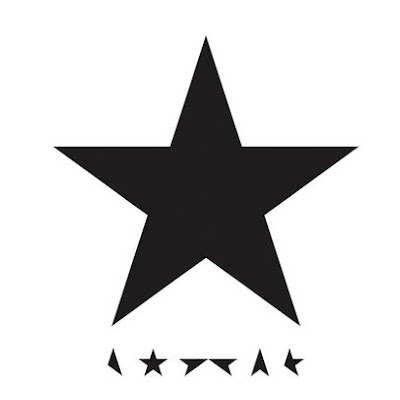David Bowie – ★ [Blackstar] (2016) review
David Bowie – ★ [Blackstar] (2016)
Having heard Blackstar prior to its public release, I felt that I should wait a respectable amount of time before sitting down and consciously attending to both my memories of David Bowie and his music, music that came out at a seminal period of my life. Needless to say, I’ve had an on again off again relationship with Bowie, feeling that nearly every album released by him has been a challenge, other than Ziggy Stardust, where he managed to pull one single thematic idea together, worked around it, and presented the world with an unshakable concept, and brilliant production of pure rock n’ roll at it’s very best.
Yet even on Ziggy Stardust, one becomes acutely aware that the nature of the album revolves around tragedy, and as on Blackstar is delivered through the narrative by an almost disembodied voice, who may or may not have been the central character, or perhaps is simply a kindred spirit who was privy to the story as it was unfolding. Bowie’s music has always seemed to be filled with rather high contrast black & white imagery, he’s always seemed to be a man who’s constantly viewing himself, and having said that, he seems to be a man who’s always lied to his fans, merely relaying a suggestive undercurrent of whom he actually is, favoring instead to become the characters in his songs, even to the point where here on Blackstar, one is left wondering if he’s actually writing about his own death, and the times in which his death will occur, or if he’s even here, created the personification of a caricature who’s standing in for him at this moment in time, connecting his past with his unsure future, while sampling images of the ill fated iconic characters he’s both developed and lived through.
Never does it seem that we have ever met the real man, say perhaps on Hunky Dory. We never met him as an actual DJ, nor was he really there as kisses were exchanged under a hail of bullets, he was rejecting fame in the song “Fame,” yet wrapping himself ever more deeply in the cloak of fame, becoming a famous person withdrawn from society and a normal walk to the corner store. There is an unshakable duality to Bowie, one that harkens back to his bicoloured eyes, which was not caused by heterochromia, but from a playground fight, with this duality becoming a central theme for all of his music. This duality cut deeply into his albums, where after Ziggy Stardust his material became laced with more and deeper experimental concepts, nearly to the point that there was merely one or two pop songs that gained radio attention, as if to capture our imaginations, and once the door was open, we’re face to face with conceptualized music that most people didn’t listen to, preferring to purchase his ‘Hits’ albums. So in effect, this pop star icon was evoking more of a Robert Fripp response, or even the 1963 collaboration John Coltrane did with Johnny Hartman, where the protagonist occupies a private nocturnal world, one filled with his own fantasies of demons, devils and angels, one that he doesn’t seem to truly comprehend, leaving these sketches to his band to translate, then stepping in to tweak, stepping in to install a liner translation.
Yes, it’s impossible to consider Blackstar without looking back and looking within, both at the man and at ourselves [as listeners]. With that in mind, and seeming for this reviewer, to be the central and insurmountable aspect to this last release, and I must tell you that I find it to be his most disturbing, most uncomfortable, and most unlistenable of albums. Of course I can accept the fact that this is just me not wanting to confront my own mortality, yet I’ve seriously confronted my mortality more times than I care to remember, having nearly died more than once. Blackstar is filled with minor chord riffs, where Bowie gives actual weight to each word, while emphasizing both the music and the lyrics with snares of disdain, as if he is attempting to ignore the scratching at his door. Others have said that it was a shrewd move to keep his own company and his silence for so long, and then burst on the scene to deliver this his most scary and tragic outing of all time … because as he was writing he was dying from his own hand, knowing this, angry that he was hungry for more life and not ready to make peace with himself and his death, leaving him to be the proverbial cracked actor.
If you love this album then I am very happy for you. If you feel that Bowie is sticking pins in our eyes, then I’m with you, feeling that this is a man, who as in life, is cryptically and melodramatically doling out visions of his life and final days, rather than shedding his skin, celebrating his life, his fans and the wonder of his nature by delivering us a visionary rock n’ roll, even if it is of the unplugged sort, of this final frontier, one that far too few artists have been able to script into verse and song.
But then, in all honesty, not believing in heaven or hell, and hating the annoyance of cell phones, I could have, and should have, expected exactly what I found here on Blackstar, an ambiguous album filled with scary monsters and no heroes, one that doesn’t see Bowie moving forward, but rather reaching the end of the line, a passenger who will never step off of the train, an album I find too uncomfortable to even keep in my collection.
– Jenell Kesler
© Copyright http://www.psychedelicbabymag.com//2016
Array




